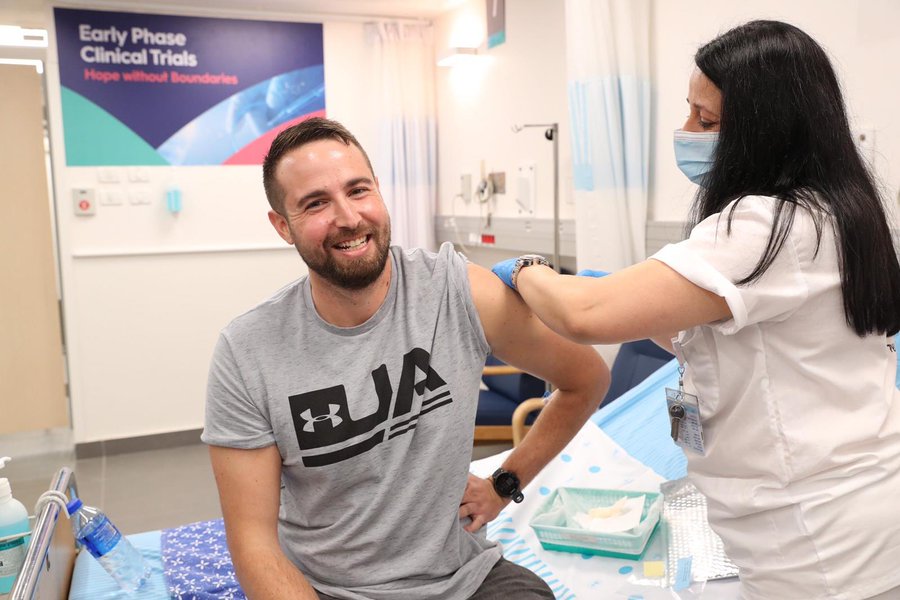JERUSALEM (VINnews) — The first volunteer to receive an experimental Israeli COVID-19 vaccine, 26-year-old undergraduate business administration student Segev Harel, said that he was feeling optimistic about participating in the first phase of clinical trials starting Sunday and saw it as an “historic opportunity.”
Join our WhatsApp groupSubscribe to our Daily Roundup Email
Segev Harel receives vaccination from nurse Hella Litwin, Sheba Hospital, Nov. 1st 2020
Harel said that he was feeling healthy and confident prior to the trial of the Brilife vaccine, a name combined from the Hebrew word Briut (health) and the English word for life, as well as the letters identifying Israel online (il). The vaccine, which is being developed by the Nes-Tziona based Israel Institute for Biological Research, was administered to Harel Sunday at a special ceremony at the Sheba-Tel Hashomer medical center in Ramat Gan.
Prime Minister Benjamin Netanyahu, Minister of Defense Benny Gantz and Minister of Health Yuli Edelstein attended the ceremony together with Harel. Another volunteer, a 34-year-old doctoral student, was also given the vaccination Sunday morning at Jerusalem’s Hadassah Hospital in Ein Kerem and two other volunteers are slated to receive it in the coming days.
“I think everything will be ok, I’m even sure of it,” said Harel, adding that “A lot of people have been harmed by coronavirus, psychologically, economically and in their health. If the small contribution I can make is to participate in this trial and give hope that we’re on the way to ending the pandemic, I’ll have played my part,” he said.
The original candidate who had been chosen to receive the first shot, 47-year-old Boaz Kolodner, was forced to withdraw from the trial after coronavirus antibodies were discovered in his blood.
The participants in the trial will remain in hospital for 24 hours under close supervision in order to monitor their response to the vaccine. Ultimately the first phase of the clinical trial will last a month and will involve some 80 volunteers aged 18 to 55, some of whom will receive the vaccine and some a placebo.
The second phase of trials which is slated to take place in December will test roughly 1,000 volunteers ages 18 to 85 at eight hospitals around the country. In this phase even volunteers who had preexisting conditions will be allowed to participate. If this phase is also successful, a third phase involving some 30,000 people will take place in April or May 2021. If there are no significant side effects in this group, the vaccine will receive approval for use in the general population.
The Defense Ministry announced last week that Israel had begun mass-producing the potential coronavirus vaccine and plans to distribute it to both Israelis and Palestinians if it is approved for use.
“In six months, the vaccine will be ready. In the meantime, the institute is working on mass production, without knowing whether the vaccine is good or not, so that we don’t reach a situation that in July, when we receive approval from the Health Ministry, we’ll be held up by production,” Prof. Amos Panet, who is on the advisory board for the Israel Institute for Biological Research, told Army Radio. The director of the Biological Institute, Shmuel Shapira, said it would produce 15 million doses in the first stage and estimated the shot could be ready by July.
At the same time, Israel is also conducting negotiations with foreign pharmaceutical firms which are at a more advanced stage in the development process to receive doses when they become available, but the Biological Institute’s vaccine is expected to serve as backup if the foreign companies, which will be pressed worldwide to provide vaccines, will not be able to manufacture the requisite vaccines in time.
The Defense Ministry has so far produced 25,000 doses for the first and second phases of the human trials. The vaccine was first tested on small animals — mice, hamsters and rabbits — and then on pigs.


